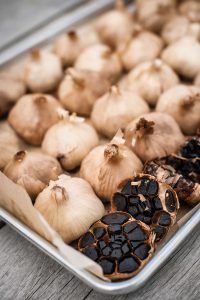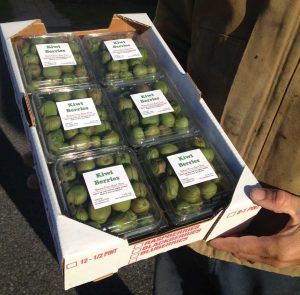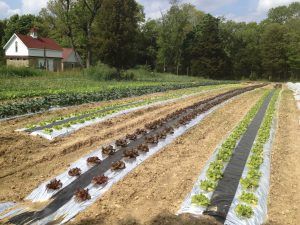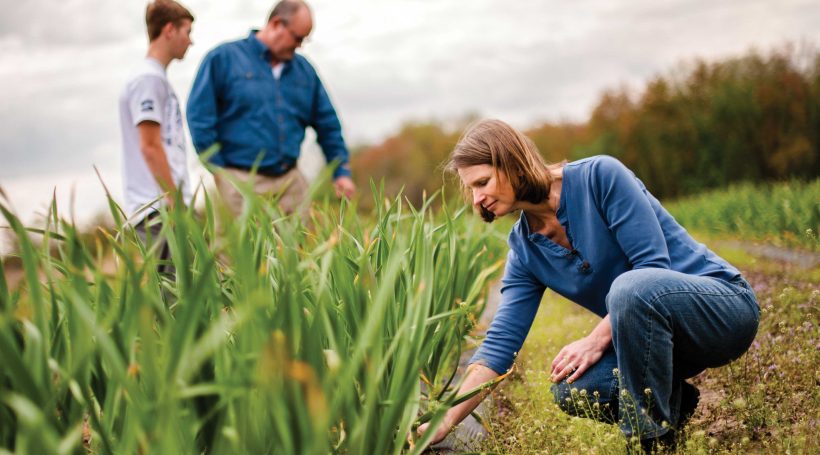Lisa Lloyd remembers the first time she brought black garlic to a garlic festival. She thought she was on friendly turf, but even at a gathering where foodies munch on treats like garlic fish-on-a-stick before cooling down with frozen bananas sprinkled with garlic plantains, black garlic was a tough sell – at first.

The Lloyd family specializes in growing black garlic at their Pennsville farm, Obis One
“You get that reaction to it, even in the restaurant community,” says Lisa of the garlic grown at her farm, Obis One. “You don’t know what to expect. You’re thinking garlic, and you’re thinking a certain flavor. Then you bite into a clove, and it’s so totally different.”
Black garlic isn’t some new cross-pollinated mutant breed of garlic. It’s just regular white garlic, planted in October and harvested in July then left to cure like any bulb of garlic will do.
But then Lisa’s husband, Patrick – professor of education, dedicated foodie and entrepreneur – takes those organically grown bulbs into his secret lair (actually, a rehabilitated 1940s Sears kit house behind his beautifully restored historic farmhouse in Pennsville), and subjects those white bulbs to a hush-hush recipe of heat, humidity and distilled water – and nothing else, except time.
The garlic ferments, the cloves blacken, the flavors deepen and sweeten, the texture turns soft and raisin-y, and the glories of black garlic emerge. It took Patrick four years to get the process right – and he still does all the planting himself.
In only a few short years, Obis One black garlic has traveled from the SJ farm to some of the finest tables on the East Coast, including the Metropolitan Museum of Art, Buddakan in Philadelphia and the dining rooms of Longwood Gardens.
But Obis One’s biggest break came after Patrick stood in line for an hour to personally pass a sample of his product to Sam Calagione, president and founder of Dogfish Head Brewery in Delaware.
“Six days later, he calls me back and says, ‘Your stuff is delicious. Let’s brew a beer together,’” Patrick says.
And brew they did. Garlic Breadth beer was released in September 2013 and will soon be available in seven cities across the United States, with Obis One serving as the exclusive black garlic provider to Dogfish through 2015.
The Lloyds’ story is one of experimentation and determination, but they’re also part of a larger community of old farms with new stewards. These ambitious farmers are racing to feed the eclectic demands of customers looking for the next big thing – or just a taste of home.
Some SJ farmers are diversifying their crops beyond tomatoes and corn for several reasons, like the growth of community-supported agriculture, increasing diversity in the local population and foodies following locavore, organic diets.
“Local people are looking to try anything new, and farms are looking to provide as many products as possible,” says Ben Casella, a field representative from the New Jersey Farm Bureau.
Farms that used to primarily supply the wholesale market are finding new, lucrative opportunities to sell directly to customers. They’re also discovering these new customers want to know where their food comes from, and they want some surprise and delight in their products.
A.T. Buzby Farm in Pilesgrove is one such farm.

Crews at A.T. Buzby Farm recently began cultivating exotic kiwi berries
Eric Buzby’s family has farmed the land since 1981, but the kiwi berries they’re currently cultivating? They’re a more recent addition. “Yeah, we were a little unsure about it at first,” says Buzby.
Yes, kiwi. Grown here, in very non-tropical SJ.
As a crop, it never crossed Buzby’s mind until he spoke with an evangelistic kiwi grower from Pennsylvania who raved about the success she was having with a hardy variety of kiwi.
Based on her recommendation (and a taste test), Buzby planted 108 vines of kiwi, and then waited four years for the vines to mature and start producing the brown fruit, which are smaller and sweeter than their more well-known counterpart, kiwifruit.
“It’s a little bit of a sell – you have to convince people to try them, because they look a little strange,” says Buzby. “But once people try them, they’re hooked. Everyone thinks they’re delicious.”
The kiwi berries spend a long time on the vine, have a short time in the sun and are ready for harvest for only a few quick weeks in the fall. But now that Buzby’s customers know where and when to watch for them, those kiwi sell – quickly.
Most of Buzby’s stock is sold at local farmers’ markets, and since it’s a perennial crop, the kiwi will keep coming for decades. “Eventually, my grandchildren can be harvesting these same vines,” he says.

More than 100 varieties of fruits, vegetables and herbs are planted each year at Savoie Organic Farm in Williamstown
The future isn’t quite as clear for Williamstown farmer Barry Savoie. His harvest at Savoie Organic Farm changes by the season, if not by the day. It could be Dragon Tongue beans, Dagma’s Perfection tomatoes or maybe Lorz Italian Softneck garlic.
“You’re not going to find them at ShopRite, you know what I mean?” Barry says.
Barry and his wife Carol settled on her family’s farm in Williamstown about a decade ago. Her father, a thoroughbred horse trainer, bought the property with the winnings from a particularly successful racehorse back in the ’50s and used the land for stables and pastures.
Barry started gardening on the property in 2005, and he received his organic certification from the state in 2007. Now, the 14-acre farm is a full-time operation, growing more than a hundred varieties of fruits, vegetables and herbs.
Variety is necessary – not just for the good of the soil and to hedge bets against disease and bad weather (like last year’s rains that took out their entire melon crop), but because farmers’ market customers have come to expect it.
The Savoies’ farm is best known for potatoes – multiple varieties and multiple colors, from the creamy yellow Carolas to the red-skinned, red-fleshed Cranberry Reds. Some boil well, some fry well and some roast well, and Carol is always there at farmers’ markets to guide shoppers on how to prepare their unfamiliar products – like the Jimmy Nardello sweet pepper.
“Every year, and as long as I’m farming, I start with a little bit of the Jimmy Nardello Italian frying pepper, and they are exquisite,” Barry says. “They look like the devil himself. But there’s not even an inkling of heat to them. They’re actually one of the sweetest peppers you could eat – way better than a red bell pepper.”
Barry sells at local farmers’ markets, but also to chefs at restaurants from New York to Princeton to Atlantic City who prize small-batch, organically grown vegetables.
But what’s hot one week can often change the next.
“The media influences things,” Carol says. “The blue potatoes – we grow one called All Blue, and they’re a violet color with a violet flesh. There was an NPR story about how the All Blues had some kind of extra antioxidant properties, and the next couple of weeks, everyone was asking, ‘Do you grow those all-blue potatoes?’ It was really funny.”
And good for business. The trick lies in staying ahead of the curve. A couple of years ago, heirloom garlic was all the rage. Barry had 10 different varieties on hand, and he still couldn’t keep up with demand. The next year, he planted $15,000 worth of seed – just in time for the demand to die down.
“Unfortunately, you don’t know what the rage is going to be,” Barry says. “I have to plant crops out six, eight months in advance, and then in July a new story comes out and everybody wants that particular product. You just have to hope what’s popular is something you planted that year.”
Richard VanVranken, agricultural agent for the Rutgers Cooperative Extension of Atlantic County, agrees that the high cost of farming in New Jersey sometimes makes niche farming a risky prospect.
“Last year, everything was kale, and if you had the right kind of kale, you could sell it,” VanVranken says. “If you had the standard blue kale, it was ho-hum. And then you started hearing snide comments on the Food Network about how kale is so 2013. So who knows that the next gourmet crop is going to be?”
If it’s black garlic, the Lloyds are ready. Last year, they had 5,000 garlic plants in the ground. This year, they’ve planted 35,000. That will not only allow them to meet the growing demand, but will also give them enough seed to become fully self-sustaining.
Beyond beer, Patrick has discovered partners everywhere, including a family-run dairy in north-central Pennsylvania that’s making a black-garlic cheese called Black Gold and an old-school Jersey pork store interested in crafting black garlic sausage.
Obis One also has its own line of products, including a seafood spice and a ground black garlic called Black Crack.
“I know – the name,” Patrick says with a grin. “We weren’t sure whether to do that or not. But that’s what it is. It’s crack.” It’s their best-selling product.
And while they’re excited to see the ever-growing foodie community embrace black garlic as the next big thing, Patrick is so confident about the nutritional value of black garlic (several studies have found that it has twice the antioxidants of regular garlic) that he’s determined to make sure the crop is not just a flash in the sauté pan.
“We feel strongly that this could have the biggest impact with regular people,” Patrick says. “Maybe that’s where the health benefits can help the most. So we’re big in education, because it needs to have wider appeal to the masses.”
Obis One
20 Sinnickson Lane, Pennsville
obisone.com
Every Saturday, the Lloyds host black garlic tastings on the farm from 10 am to 3 pm.
A.T. Buzby Farm
21 Black Road, Pilesgrove
buzbyfarm.com
Find kiwi berries, in season, at farmers’ markets attended by the farm. A list is available on the website.
Savoie Organic Farm
990 East Malaga Road, Williamstown
savoieorganicfarm.com
Savoie sells at the Collingswood Farmers’ Market on Saturdays and at Headhouse Square Farmers’ Market in Philadelphia on Sundays, in season.










